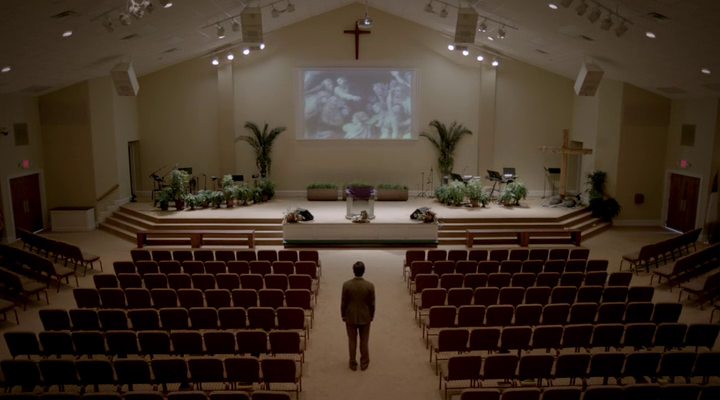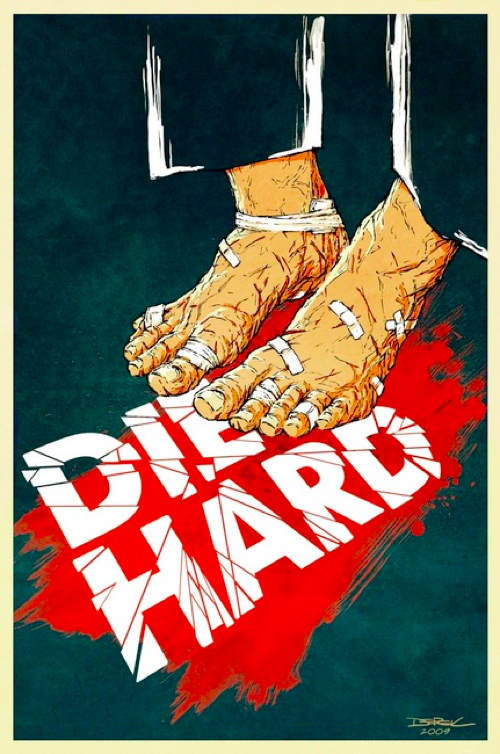Rectify
Created by Ray McKinnon
Stars Aden Young, Abigail Spencer, J. Smith-Cameron, Adelaide Clemons, and Clayne Crawford
Season two begins June 19th at 9pm ET on Sundance (season 1 available on Netflix)
There are plenty of television shows in 2014 with the ability to amaze an audience, surprising them with bold stories, impressing them with elaborate visuals, or engaging them by drawing parallels to our own world and lives. Many of these shows rank among the best on television, regularly analyzed by critics for their ability to blend cinematic elements, symbolic metaphors, and poignant dissections of life, that blend of intelligent and entertaining that’s hard to find at the box office in this day and age of loud tent poles and cliche, overwrought ‘indie’ films.
However, these great shows (of which there are too many to name in this small space), there have been but a few that can transcend entertainment or layered cultural reflection: there are some shows that challenge us to contemplate our very realities, reaching beyond (or in some cases, straight through) the mundanities of life so many other shows try to accent with cinematic makeup, to ponder the bigger questions and ideas of life. These philosophic shows are hard to come by on television – and even the best of them (like Hannibal, Game of Thrones, and The Americans, to name a few) struggle to break the fourth wall and say something about our human nature, rather than the one in its own reality.
In all honesty, only a few shows in the history of television have aspired to be truly philosophic, to explore the underpinnings of faith and the place where it meets logic, using dramatic venue and acute examinations of the systems at play in our reality (technological, social, political… take your pick) as a true exploration of the soul, a mediation on the very nature of life itself. Parts of LOST, moments of Breaking Bad, lots of Enlightened… it’s a rare thing to see a television show remove the pretext of judgment, and examine issues of the soul, heart, and mind with a mind unhindered by the rules of its reality, or a marriage to audience expectations for drama.
Rectify is one of those shows – and although only six episodes have aired, it’s already one of my all-time favorites.
Created by Ray McKinnon (best recognized for his acting work on shows like Deadwood and Sons of Anarchy), Rectify was a show that nearly never aired. Originally at AMC, Rectify was set to star Walton Goggins before the project was delayed, recasting recently-released death row inmate Daniel Holden with Australian actor Aden Young, and surrounding him with fine actors like Abigail Spencer, J. Smith-Cameron, and Adelaide Clemens. Essentially the first original series produced by Sundance, Rectify featured all of the trappings of traditional dramas: a murder mystery for a narrative hook, an “anti-hero” for a main character, and an indie-friendly “portrait of small America” setting (not to mention the societal edge, with the death penalty debate) – but when its six episodes aired last summer, proved to be so, so much more.
Rectify‘s first two or three hours mostly feel like a normal, hour-long cable drama – albeit told at a much slower pace, each of the first season’s episodes taking place roughly over the course of a day (interspersed with flashbacks of Daniel’s two-decade long stay on death row, for confessing to raping and murdering a 16-year old girl). It tells the story of Daniel’s reintegration to society after a DNA technicality vacated his sentence: the former DA (now a state senator) wants justice, and there’s a noticeable divide in Paulie, Georgia (where the show is set) over Daniel’s innocence, a 20-year old tragedy made fresh by his release from prison. There’s dramatic intrigue, angsty white man drama (mainly seen with Ted Jr., Daniel’s stepbrother), and little else early on – save for Abigail Spencer’s performance as Daniel’s little sister Amantha, one of the most layered, beautifully raw performances on television right now.
But slowly, Rectify reveals itself to be something much, much more. On top of the subtle critique of the American justice system and the fascinating rural world McKinnon and his writers create in six hours, Rectify contemplates the very presence of God, of the ideas of rebirth and salvation, pondering the very existence of ideas like absolution, justice, and truth. And it does so quietly, with a camera that never strays from the beauty to be found in the simplicity of life, always placing the audience directly in the shoes of Daniel – a man whose been in jail since he was 18, and isn’t used to the unpredictability and “variables” that come with every day life on the outside, where one’s purpose is defined by how they live, not how they prepare to die.
There’s beautiful, poignant television, and then there’s Rectify, a show that unabashedly challenges its audience with odd Biblical asides (in one episode, W. Earl Brown makes a wonderful cameo as a goat-stealing, Greco-Roman wrestling drifter; at one point, Daniel asks him if he’s going to walk the goats they steal off a cliff, like swine) and a penchant for capturing every single ray of sunlight in each shot, truly conveying the beauty of the world to a man stuck in the purgatorial, white-washed womb of death row for his entire adult life. It’s slow, and at times, revels in making the audience contemplate wildly uncomfortable ideas (the show’s exploration of sex in particular in unsettling, and often fascinating), from the point of a main character who is often so overwhelmed, he can only speak in short, awkward bursts.
I’m selling Rectify a bit short plot-wise: there are plenty of things “going on” in Rectify, for those who are looking for melodramatic touches, or more inherently satisfying aspects, like narrative crescendos or attention-grabbing performance. But that’s not what Rectify is about: Rectify uses those devices as a prism, one that puts the beautiful, fucked-up rainbow of life on full display, a kaleidoscope of reveling in the beauty of our “goodness”(at one point, Daniel points out to his sister-in-law Tawney that Thomas Aquinas believed God reveals himself in nature), as well as shivering at the horror of our “badness”, and how easily we cave into our raw emotions and subsequently try to avoid the consequences.
In a landscape full of solid shows telling interesting stories or presenting us with layered, complex characters, Rectify challenges us to be reborn, to find the courage to forgive ourselves for events both in and out of our control. It does so in the most unconventional way possible: by forcing the audience to reflect on themselves through the experiences of a death row convict, a man experiencing a rebirth many of us equally wish for and fear. Is there such thing as “new life”, or is time just the flat circle Rust Cohle thought it was? Rectify doesn’t pretend to have the answers (unlike a lot of other television shows, which border on pretentious with their ideologies, no matter how accurate or poignant): all it knows is the only peace in this complicated, repetitive life are “in the moments between the seconds”, a philosophy as darkly poetic and emotionally rewarding (“Jacob’s Ladder” remains one of the most moving season finales in recent memory, even a year after airing) as you’ll find on television.
— Randy







